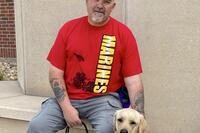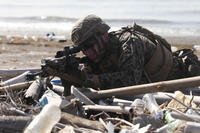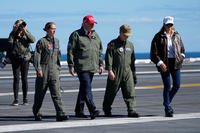The U.S. plans to leave 9,800 troops in Afghanistan at the end of this year, cut that force in half at the end of 2015, and have all troops out with the exception of embassy security at the end of 2016, President Obama announced Tuesday.
In seeking to end the nation's longest war, Obama said "it's time to turn the page on more than a decade when so much of our foreign policy was focused on the wars in Afghanistan and Iraq."
"Now, it's time to finish the job we started" when U.S. forces in October 2001 began attack Al Qaeda and Taliban positions in Afghanistan, Obama said in a 12-minute address from the White House Rose Garden.
"In addition to bringing our troops home, this new chapter in American foreign policy will allow us to redirect some of the resources saved by ending these two wars to respond more nimbly to the changing threat of terrorism, while addressing a broader set of priorities around the globe," Obama said.
Obama's announcement followed his surprise Memorial Day visit to Kabul to thank the 32,000 U.S. troops now in Afghanistan and meet with Marine Gen. Joseph Dunford, the U.S. and NATO commander, to discuss the pullout plan.
Dunford was believed to have recommended a force of 10,000 to remain in Afghanistan at the end of this year, and Obama's plan was generally consistent with Dunford's recommendations.
Obama noted that the plan was contingent upon the Afghans signing a new Bilateral Security Agreement for the continued presence of U.S. and NATO forces post-2014.
Afghan President Hamid Karzai has repeatedly refused to sign the BSA worked out by U.S. and allied negotiators with Afghan officials, but the two leading candidates to succeed Karzai have already announced that they would agree to the deal.
A runoff election has been scheduled for June 14 to choose Karzai's successor in what would be the first peaceful and democratic transition of government in Afghanistan's history.
Republicans have criticized Obama for setting timetables for the withdrawal from Iraq and they voiced similar objections to the Afghanistan plan.
Rep. Howard "Buck" McKeon, chairman of the House Armed Services Committee, said he was pleased that Obama went along with Dunford's recommendation on troop levels but "holding this mission to an arbitrary egg-timer doesn't make a lick of sense strategically."
"We are in Afghanistan because it was the spawning ground of al Qaeda and the devastating attack on American soil," McKeon said. "Those threats still exist. We leave when the Afghans can manage that threat, rather than on convenient political deadlines that favor poll numbers over our security."
However, senior Obama administration security officials, speaking on background, said that the Afghan National Security Forces have taken the lead security role for more than a year and had proven their mettle, most recently in providing security for the presidential elections last month.
"We never signed up to be a permanent security force," a senior official said. As for the timetable, the official said that "there's great utility in people knowing how the plan is going to go. We believe it's necessary for planning purposes to be clear to our allies."
The expectation was that the NATO allies would commit a number of troops to match the 9,800 from the U.S. to provide for what the senior official called a "four corners" allied mission in Afghanistan through 2015.
The official was suggesting that the Italians would continue to operate out of western Herat, the Germans would be in northern Mazar-i-Sharif and the Americans would likely be concentrated at southeastern Jalalabad and at the main Bagram Air Base north of Kabul.
Both U.S. and allied troops would serve training and advisory roles, as well as a limited counter-terror mission aimed solely at the remnants of al Qaeda, the official said.
At the end of 2015, the plan was to have the U.S. forces cut to about 4,900 and base them mainly in Kabul and at Bagram, the officials said. By the end of 2016, the U.S. military presence would be reduced to embassy security in Kabul, the officials said.
Without giving details, the officials said that the U.S. would continue to provide financial support for the Afghan government indefinitely, but "starting next year, the Afghans will be fully responsible" for their own security and dealing with the Taliban threat.
"That is a task for the Afghan people," Obama said. "We have to recognize that Afghanistan will not be a perfect place and it is not America's responsibility to make it one."
Obama's remarks on Afghanistan were a prelude to his major address on a new direction for U.S. foreign policy at the U.S. Military Academy at West Point on Wednesday.
At West Point, Obama "will explain how we move out of a period of war in Iraq and Afghanistan to a new stage in our engagement with the world, what we expect to accomplish over the next two-and-a-half years of the administration, and how our approach in hot spots like Ukraine, Iran and Syria fit into that construct," said a senior official who traveled with Obama to Afghanistan over the weekend.
"You will hear the president discuss how the United States will use all the tools in our arsenal without overreaching," the official said.
Defense Secretary Chuck Hagel, who met with Obama at the White House shortly before the plan was announced, said: "I strongly support the President's decision to maintain a limited U.S. troop presence in Afghanistan after our combat mission ends there later this year."
Hagel was leaving Wednesday on a 12-day trip Wednesday with the first stop in Singapore to discuss with allies the rebalance of U.S. forces to the Pacific and China's recent aggressive actions in pursuing territorial claims in the South and East China Seas.
In his Rose Garden remarks, Obama paid tribute to the U.S. and allied troops who enabled Afghanistan to reach the point where withdrawals could be planned.
"It is an extraordinary sacrifice for them and their families," Obama said of the troops.
In nearly 13 years of war in Afghanistan, a total of 2,322 U.S. troops have been killed and more than 17,600 wounded. NATO troops have suffered 1,119 fatalities to bring the allied number of killed to 3,441.
-- Richard Sisk can be reached at Richard.Sisk@monster.com.






























